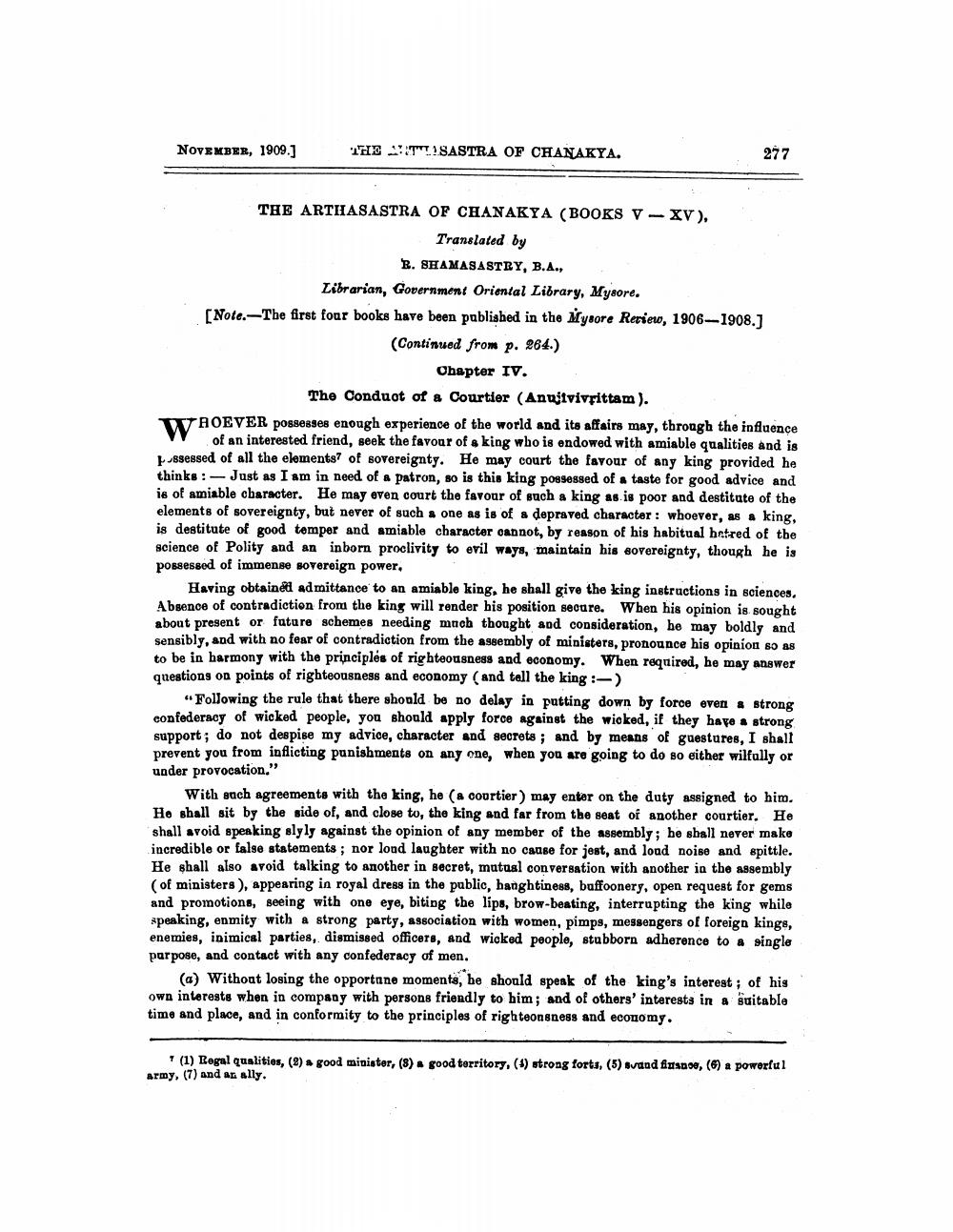________________
NOVEMBER, 1909.]
THE ITT! SASTRA OF CHANAKYA.
THE ARTIASASTRA OF CHANAKYA (BOOKS V-XV),
Translated by
B. SHAMASASTRY, B.A.,
Librarian, Government Oriental Library, Mysore. [Note.-The first four books have been published in the Mysore Review, 1906-1908.]
(Continued from p. 264.)
Chapter IV.
The Conduct of a Courtier (Anujivivfittam). W A OEVER possesses enough experience of the world and its affairs may, through the influence
of an interested friend, seek the favour of & king who is endowed with amiable qualities and is Bsessed of all the elements of sovereignty. He may court the favour of any king provided he thinks :- Just as I am in need of a patron, so is this king possessed of a taste for good advice and is of amiable character. He may even court the favour of such a king as is poor and destitute of the elements of sovereignty, but never of such s one as is of a depraved character: whoever, as a king, is destitute of good temper and amiable character cannot, by reason of his habitual hatred of the science of Polity and an inborn proclivity to evil ways, maintain his sovereignty, though he is possessed of immense sovereign power,
Having obtained admittance to an amiable king, he shall give the king instructions in sciences. Absence of contradiction from the king will render his position secure. When his opinion is sought about present or future schemes needing much thought and consideration, he may boldly and sensibly, and with no fear of contradiction from the assembly of ministers, pronounce his opinion so as to be in harmony with the principles of righteousness and economy. When required, he may answer questions on points of righteousness and economy (and tell the king :-)
"Following the rule that there should be no delay in putting down by force even & strong confederacy of wicked people, you should apply force against the wicked, if they have a strong support; do not despise my advice, character and secrets ; and by means of guestures, I shall prevent you from inflicting punishments on any one, when you are going to do so either wilfully or under provocation."
With each agreements with the king, he (a courtier ) may enter on the duty assigned to him. Ho shall sit by the side of, and close to, the king and far from the seat of another courtier. He shall avoid speaking slyly against the opinion of any member of the assembly; be shall never make incredible or false statements ; nor loud laughter with no cause for jest, and load noise and spittle. He shall also avoid talking to another in secret, mutual conversation with another in the assembly (of ministers), appearing in royal dress in the public, hanghtiness, buffoonery, open request for gems and promotions, seeing with one eye, biting the lips, brow-beating, interrupting the king while speaking, enmity with a strong party, association with women, pimps, messengers of foreiga kings, enemies, inimical parties, dismissed officers, and wicked people, stubborn adherence to a single parpose, and contact with any confederacy of men.
(a) Without losing the opportano moments, he should speak of the king's interest ; of his own interests when in company with persons friendly to him; and of others' interests in a suitable time and place, and in conformity to the principles of righteousness and economy.
(1) Regal qualities, (3) > good minister, (8) ► good territory, (1) strong forts, (5) svand fisse, (6) a powerful Army, (7) and an ally.




